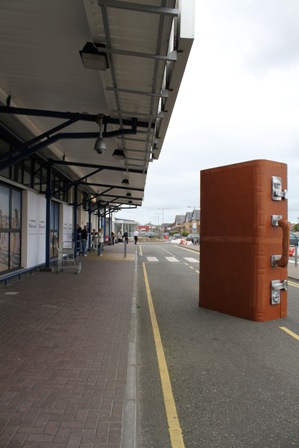
Starting today, January 15, airlines will no longer allow passengers to checkg or carry on “smart luggage” with non-removable lithium batteries.
Powered luggage began appearing on the market a few years ago and some new versions of these high-tech bags can weigh themselves, be locked remotely, report their locations, provide power for gadgets, offer rides to the gate and follow travelers around.
The extras are enticing, but industry-wide concern over lithium batteries igniting and starting fires led the International Air Transport Association to instruct its almost 300 airline members to restrict carriage of certain bags:
“Effective 15 January 2018, for IATA member airlines, baggage with removable installed Lithium batteries (“smart luggage”) must be carried as carry-on baggage or the battery must be removed. With the battery removed the bag can be checked-in. If the battery cannot be removed, the bag is forbidden for carriage.”
Citing “safety management and risk mitigation,” American Airlines was among the first to alert its customers to the impending rule change. The carrier also said the standard question it asks customers checking bags – “Have you packed any e-cigarettes or spare batteries for laptops, cellphones or cameras?” – would be altered to include smart bags.
Other airlines are changing their check-in and boarding procedures as well.
“Throughout our guests’ journey, we will remind them to remove all lithium batteries from checked luggage, or disconnect and turn off batteries being stored in the overhead bins,” said Alex Da silva, a Hawaiian Airlines spokesman, “We are also training employees on the various types of smart bags so they may assist customers.”
Some smart luggage manufacturers are scrambling to redesign their smart bag products to comply with the new airline rules. Others are making sure customers know how, and how easily, the lithium batteries can be removed from their bags. And companies who have smart bags without lithium batteries are touting that feature.
“We believed that there would come a time when lithium batteries could be seen as a safety issue. So we purposely powered our luggage with AAA batteries to avoid any of these potential future rulings,” said Emran Sheikh, President and CEO of luggage manufacturer and distributor Heys International.
Sheikh and others emphasize that it is the type of battery used in some “smart” luggage designs that is the problem, not the category of ‘smart luggage’ in general.
“The airline industry’s recent attention to safety surrounding lithium ion batteries should boost our confidence that the travel industry is monitoring current trends and updating their own best practices to reflect modern travelers’ habits and needs,” said Michele Marini Pittenger, president of the Travel Goods Association, “Consumers can expect to see luggage manufacturers respond accordingly and release new iterations of smart luggage featuring even safer power sources.”
(My story on new smart luggage rules first appeared on CNBC in a slightly different form.)
Thanks for visiting Stuck at the Airport. Subscribe to get daily travel tidbits. And follow me on Twitter at @hbaskas and Instagram.